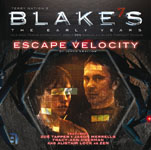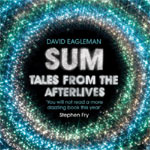
The back-story of an artificial intelligence begins…
 Blake’s 7: The Early Years: Zen: Escape Velocity (Volume 2.1)
Blake’s 7: The Early Years: Zen: Escape Velocity (Volume 2.1)
By James Swallow; Directed by Andrew Mark Sewell; Performed by a full cast
1 CD – Approx. 1 Hour [AUDIO DRAMA]
Publisher: B7 Productions
Published: April 26, 2010
ISBN: 978190657709
Based on Terry Nation’s seminal 70s science fiction TV series, The Early Years is a prequel series of audio stories that explores the origins of key Blake’s 7 characters prior to them meeting rebel leader Roj Blake. This latest entry to the ever-expanding series takes a new twist, concentrating on a character that doesn’t breathe or have any parents, the synthetic intelligence known only as Zen. When Roj Blake first stepped on board the mysterious, derelict alien spaceship Liberator, his every movement was monitored by the ship’s controlling intelligence, Zen Luckily, Blake and his rebel crew managed to gain the ‘confidence’ of this creation from an alien world and so he was able to use the Liberator in their quest for justice against the Federation. But the origins of Zen have remained a mystery, until now. What terrible catastrophe left the Liberator drifting and shattered? What drove the ship’s intelligence to murder its original crew? What dark secrets lie at the heart of this alien machine? And are Blake and his crew really safe on board the Liberator? Featuring Zoë Tapper, Jason Merrells, Tracy-Ann Oberman and Alistair Lock as Zen.
An audiobook by a neuroscientist…

 Sum: Forty Tales From The Afterlives
Sum: Forty Tales From The Afterlives
By David Eagleman; Read by Gillian Anderson, Emily Blunt, Nick Cave, Jarvis Cocker, Noel Fielding and Stephen Fry
Audible Download or CDs – Approx. 2 Hours 42 Minutes [UNABRIDGED]
Publisher: Canongate Books / Brilliance Audio
Published: March 31, 2010 / June 2010
In this astounding book, David Eagleman entertains 40 fictional possibilities of life beyond death. With wit and humanity he asks the key questions about existence, hope, technology and love. These stories are full of big ideas and bold imagination.This audiobook assembles a stellar cast of readers who bring the scenarios of SUM brilliantly alive: Gillian Anderson, Emily Blunt, Nick Cave, Jarvis Cocker, Jack Davenport, Lisa Dwan, David Eagleman, Noel Fielding, Kerry Fox, Stephen Fry, Clarke Peters, Lemn Sissay and Harriet Walter.
After spotting a glowing review, I had to add this to the list…
 Greater Good
Greater Good
By Nathan P. Butler; Read by Nathan P. Butler
34 Zipped MP3 Files or Podcast – [UNABRIDGED]
Publisher: Podiobooks.com
Published: November 2009
In the world of tomorrow, the American Regime dominates our hemisphere, ruled by a new nobility: telepaths. While this powerful new minority rules over the normal human majority, society enjoys stability and security. However, with this new world comes new prejudices and oppression. Now, a powerful telepathic killer from the future has come to our present to eliminate this new world – a serial killer today, a genocide for tomorrow. It is up to a law enforcement officer from the future and an unwitting FBI agent to stop him before he can act in the name of the… Greater Good.
Posted by Jesse Willis










 Stephen Fry – In The Beginning Was The Nerd
Stephen Fry – In The Beginning Was The Nerd